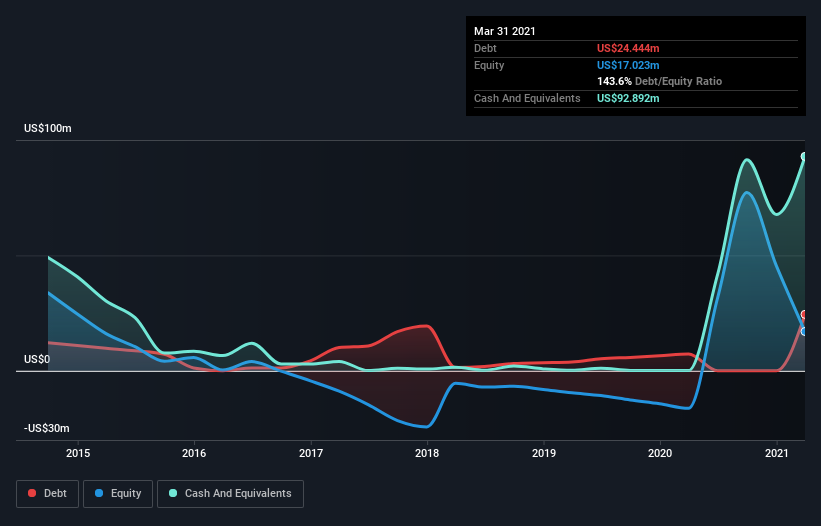Is Humanigen (NASDAQ:HGEN) Using Too Much Debt?
The external fund manager backed by Berkshire Hathaway's Charlie Munger, Li Lu, makes no bones about it when he says 'The biggest investment risk is not the volatility of prices, but whether you will suffer a permanent loss of capital.' So it seems the smart money knows that debt - which is usually involved in bankruptcies - is a very important factor, when you assess how risky a company is. We note that Humanigen, Inc. (NASDAQ:HGEN) does have debt on its balance sheet. But should shareholders be worried about its use of debt?
When Is Debt A Problem?
Debt and other liabilities become risky for a business when it cannot easily fulfill those obligations, either with free cash flow or by raising capital at an attractive price. If things get really bad, the lenders can take control of the business. While that is not too common, we often do see indebted companies permanently diluting shareholders because lenders force them to raise capital at a distressed price. By replacing dilution, though, debt can be an extremely good tool for businesses that need capital to invest in growth at high rates of return. When we examine debt levels, we first consider both cash and debt levels, together.
Check out our latest analysis for Humanigen
How Much Debt Does Humanigen Carry?
The image below, which you can click on for greater detail, shows that at March 2021 Humanigen had debt of US$24.4m, up from US$7.32m in one year. However, its balance sheet shows it holds US$92.9m in cash, so it actually has US$68.4m net cash.
How Strong Is Humanigen's Balance Sheet?
We can see from the most recent balance sheet that Humanigen had liabilities of US$53.3m falling due within a year, and liabilities of US$28.6m due beyond that. Offsetting these obligations, it had cash of US$92.9m as well as receivables valued at US$5.01m due within 12 months. So it can boast US$16.1m more liquid assets than total liabilities.
Having regard to Humanigen's size, it seems that its liquid assets are well balanced with its total liabilities. So it's very unlikely that the US$939.4m company is short on cash, but still worth keeping an eye on the balance sheet. Succinctly put, Humanigen boasts net cash, so it's fair to say it does not have a heavy debt load! The balance sheet is clearly the area to focus on when you are analysing debt. But ultimately the future profitability of the business will decide if Humanigen can strengthen its balance sheet over time. So if you're focused on the future you can check out this free report showing analyst profit forecasts.
In the last year Humanigen managed to produce its first revenue as a listed company, but given the lack of profit, shareholders will no doubt be hoping to see some strong increases.
So How Risky Is Humanigen?
By their very nature companies that are losing money are more risky than those with a long history of profitability. And the fact is that over the last twelve months Humanigen lost money at the earnings before interest and tax (EBIT) line. And over the same period it saw negative free cash outflow of US$105m and booked a US$153m accounting loss. With only US$68.4m on the balance sheet, it would appear that its going to need to raise capital again soon. Importantly, Humanigen's revenue growth is hot to trot. While unprofitable companies can be risky, they can also grow hard and fast in those pre-profit years. When analysing debt levels, the balance sheet is the obvious place to start. But ultimately, every company can contain risks that exist outside of the balance sheet. Be aware that Humanigen is showing 6 warning signs in our investment analysis , and 2 of those shouldn't be ignored...
Of course, if you're the type of investor who prefers buying stocks without the burden of debt, then don't hesitate to discover our exclusive list of net cash growth stocks, today.
This article by Simply Wall St is general in nature. It does not constitute a recommendation to buy or sell any stock, and does not take account of your objectives, or your financial situation. We aim to bring you long-term focused analysis driven by fundamental data. Note that our analysis may not factor in the latest price-sensitive company announcements or qualitative material. Simply Wall St has no position in any stocks mentioned.
Have feedback on this article? Concerned about the content? Get in touch with us directly. Alternatively, email editorial-team (at) simplywallst.com.

